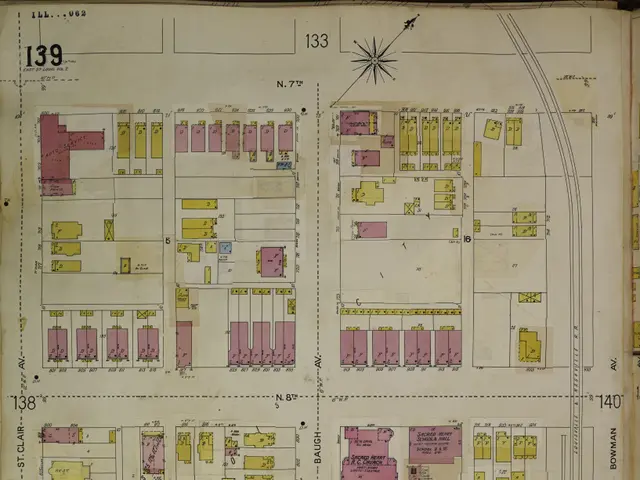Blind-Eyed Betting: The Dark Side of Commercial Casinos and AML Regulations
Swerving Away from AML Laws in Casinos Globally
Casino executives face scrutiny and hefty penalties due to pressure from a gaming lawyer and author, uncovering instances of money laundering.
Gaming attorney and former UNLV professor, Anthony Cabot, sheds light on how pressure to boost revenue has driven gambling establishments across the globe to overlook criminal activity.
From the glitzy streets of Las Vegas to the gambling mecca of Macau, casinos have been under scrutiny for failing to adhere to Anti-Money Laundering (AML) laws. A recent fine of $10.5 million levied against Resorts World Las Vegas for reportedly turning a blind eye to illicit bookmaking activities is amongst the highest in Nevada's history.
Cabot, who recently spoke on casino ethics at the World Game Protection Conference in Las Vegas, said such hefty fines signal the need for the industry to prioritize self-regulation, lest they face substantial financial penalties.
The Wynn Debacle and Its Aftermath
In a shocking case, Wynn Resorts was slammed with a $20 million fine in 2019 for its lackluster investigation into sexual misconduct allegations against former CEO and Chairman Steve Wynn. These scandals have become increasingly commonplace in the casino industry.
In September 2023, Wynn Resorts agreed to pay $130 million to the federal government to settle criminal charges that it colluded with unlicensed money-transmitting businesses internationally to transfer funds for its benefit. The Nevada Gaming Control Board has yet to take action against Wynn, owing to the federal fine imposed.
The Fall of Resorts World and Scott Sibella
Former Resorts World Las Vegas president and COO, Scott Sibella, found himself in hot water last December, after pleading guilty to federal charges for concealing illegal gamblers at the MGM Grand in 2018. His gaming license was stripped as a consequence.
Cabot deplores the widespread disregard for ethics in the industry, which he claims stems from the excessive pressure put on casino executives to amass revenue. The regulatory standards in various countries have been tainted by money-laundering activities, with Australia and neighboring BC in Canada facing the brunt of these illegitimate practices.
Down Under: The Copious Cases of Money Laundering
Casinos in Australia have faced a series of money-laundering cases in recent years, involving criminal gangs hailing from China. At the forefront of this phenomenon are Star Entertainment and Crown Resorts, who have been fined millions over their poor AML protocols. In July 2023, Crown was hit with a staggering $300 million fine by the Federal Court of Australia, while Star Entertainment faced a $62 million fine in 2022.
More alarmingly, Star Entertainment's Sydney casino was placed under court-appointed management last October, with its license suspension being extended until 2025. These regulatory breaches, according to Cabot, rank among the worst in several decades.
Opus De Casino: Unraveling the Global Network of Chinese Organized Crime
Cabot has penned an upcoming book, Casino Redux: Unveiling the Global Network of Chinese Organized Crime, delving into the tales of Triad leaders and their machinations to establish themselves in the lucrative global casino industry across Asia, Australia, and North America. He was astounded by the lack of ethics in the industry and felt compelled to write the book to shed light on the issue.
"On an international basis, casino ethics are horrendous," Cabot stated. "The offending companies in Australia were not merely employees crossing the line; it was institutional. It doesn't shock me that such events transpire in Macau, Laos, Cambodia, and even the Philippines, but the scale at which it happened in Australia was shocking to me."
The Land of Opportunities?
While the U.S. has had its share of lapses, they have been mostly isolated and addressed accordingly, according to Cabot. The facts surrounding the Wynn case will be revealed during the Gaming Control Board's disciplinary proceedings.
"In some instances, these transnational cases are backed by the Triads, while others aren't," Cabot explained. "Casinos often cooperate in facilitating illicit money transfers from one banking system to another, especially when the involved funds are acquired through illegal activities."
Regulatory Inconsistencies and Loopholes
Cabot is disheartened by the inconsistencies in casino regulation, particularly the failure to revoke gaming licenses for major breaches.
"Regulatory bodies must prioritize revoking licenses for egregious infractions to serve as a deterrent for other casinos," he urged. "Otherwise, the message conveyed is that casino companies are 'too big to fail,' which is a dangerous proposition. Despite hefty fines, such a message removes one of the major deterrents to regulatory compliance."
In Nevada, Cabot sees improvement in adherence to AML laws, although some reforms are necessary, particularly in holding the individuals responsible for breaches accountable.
"There exists a concern that the fines are levied against companies instead of the culprits who committed the violations. In many cases, offenders depart the company, leaving the fine burden on the shareholders rather than the actual wrongdoers."
The Dual-Edged Sword of Resorts World
The case filed against Resorts World in August, initially a 31-page document detailing 12 counts against the operator, has since been reduced to 27 pages and 10 counts, following an amendment citing that Resorts World had conducted sufficient AML reviews and due diligence for two individuals, Edwin Ting and Chad Iwamoto.
"The case involving illegal bookmakers at Resorts World is distinct from the larger issue of Chinese money laundering within the global casino industry," Cabot clarified. "However, the common assumption that such activities are widespread within the industry is concerning."
The Need for Vigilance and Compliance
In an ever-evolving global gambling landscape, casinos must be vigilant in combatting money laundering, particularly in crash games and with cryptocurrency transactions. Regular compliance training and audits are essential to ensure adherence to AML regulations and maintain the integrity of the industry.
"Casinos should view compliance not as an obstacle but as a means to protect their reputation, customers, and shareholders from potential financial and reputational damage," Cabot concluded.
- Casino culture has been tainted by a disregard for ethical practices, as Anthony Cabot, a gaming attorney, points out, with institutions like Wynn Resorts and Resorts World facing hefty fines for overlooking criminal activities and AML laws.
- The global casino industry, as detailed in Anthony Cabot's upcoming book, Casino Redux: Unveiling the Global Network of Chinese Organized Crime, is marred by a lack of ethics, with Triad leaders exploiting lucrative opportunities in casino-and-gambling establishments across Asia, Australia, and North America.







